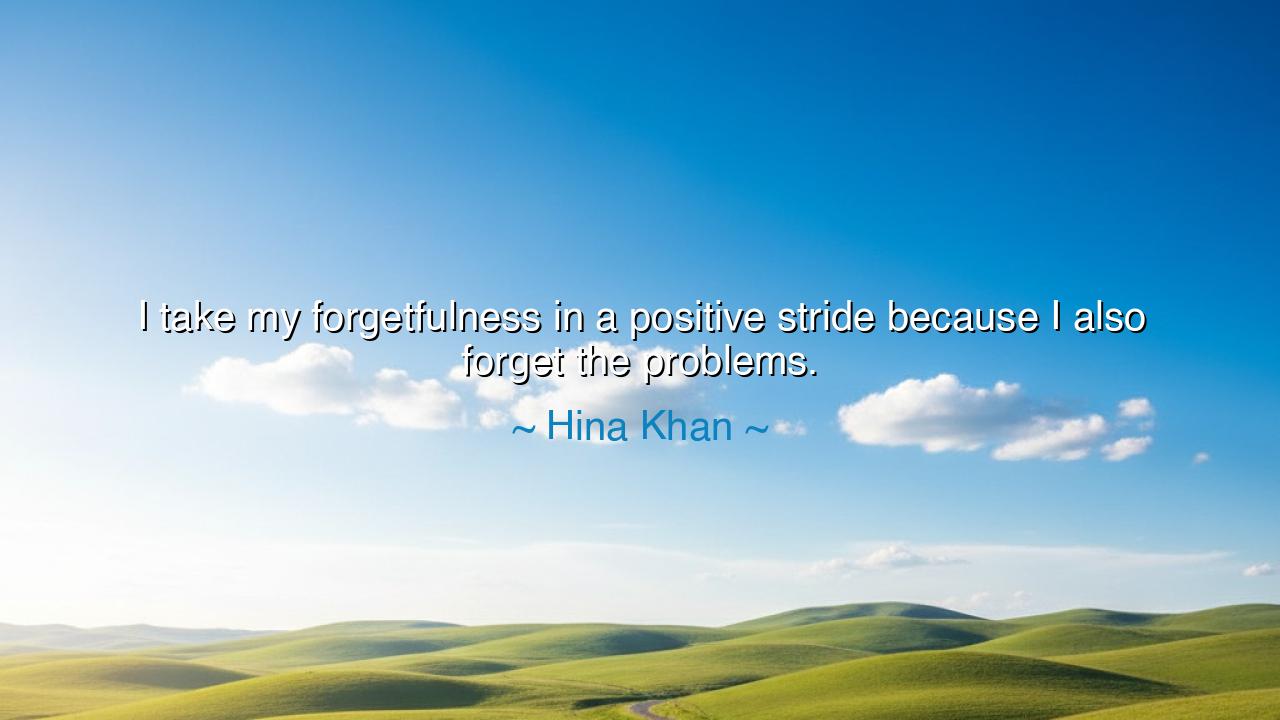
I take my forgetfulness in a positive stride because I also






When Hina Khan declared, “I take my forgetfulness in a positive stride because I also forget the problems,” she spoke a truth hidden beneath the ordinary struggles of human frailty. Her words remind us that even our weaknesses can become blessings if we hold them with wisdom. For what is forgetfulness, often seen as a failing, if it allows us to release the burdens of sorrow and the weight of troubles? To let go is not always loss; sometimes it is freedom.
The ancients themselves treasured this wisdom. The Greeks told of the River Lethe in the underworld, whose waters brought forgetfulness. To drink from it was to be freed from griefs and memories that chained the soul. Though they feared its power to erase identity, they also saw in it a mercy: that not all things are worth remembering. Likewise, Hina’s words carry this insight — that the art of living lies not only in memory, but also in forgetting what is heavy and choosing what is light.
History gives us powerful testimony. Consider Nelson Mandela, who, after twenty-seven years in prison, emerged with the choice to remember bitterness or to forget it. He chose forgetfulness of vengeance, carrying instead the memory of hope. By forgetting his problems in the bitterness of hatred, he embraced reconciliation and peace, becoming not only a leader but a healer of nations. This is the essence of Hina’s wisdom: to let the mind’s forgetfulness serve as a balm, softening the sting of wounds that would otherwise never close.
There is also courage in her teaching. Many of us cling to our grievances, rehearsing them in our minds until they harden into chains. Yet the ability to forget is itself a form of strength. To lay aside the memory of wrongs is to step free from the prison of resentment. This is not weakness, but a higher victory — for the one who forgets the wound is no longer ruled by it. In this way, forgetfulness becomes not a curse, but a teacher of peace.
The heart of this teaching is transformation. Every flaw, every limitation, every imperfection of the human condition may, if held rightly, reveal itself as a gift. Where others see only forgetfulness, Hina Khan sees release. Where others lament, she finds liberation. This perspective itself is the secret: life is not shaped only by what happens to us, but by how we choose to interpret it.
The lesson is clear. Embrace your imperfections with wisdom. See in them not only weakness, but the hidden door to strength. When you forget, let it be the problems and the sorrows that slip first from your memory. And when you remember, let it be the joys, the kindnesses, and the triumphs that endure. In this way, your heart will be light, and your spirit unburdened.
In practice, this means training yourself to release the past. When memories of pain arise, do not feed them; let them pass like clouds across the sky. Keep journals not of grievances, but of gratitude, so that what remains in your memory is the nourishment of hope. Surround yourself with companions who help you laugh at your stumblings, for laughter itself is a form of forgetfulness.
Thus, let us carry Hina Khan’s wisdom: take forgetfulness in a positive stride, for even flaws may become fountains of joy. Forget not your blessings, but let your problems dissolve into the river of time. Live in this way, and your days will not be shackled by the weight of memory, but will flow free, peaceful, and full of light.






TBthu bui
Reading this evokes a sense of calm and lightheartedness, almost as if the speaker is gently shrugging off life’s difficulties. But I wonder, is this truly a sustainable approach to life, or is it more of a temporary relief mechanism? Could it influence relationships or professional life if problems are frequently forgotten? I’d be interested in hearing whether this philosophy could be integrated into modern stress management practices without negative consequences.
QTNguyen Quynh Trang
From a practical standpoint, I’m curious if there’s a scientific explanation behind this sentiment. Could there be neurological benefits to forgetting negative experiences or challenges? How does this affect emotional health and decision-making? I’m also wondering if it’s possible to train oneself to forget selectively without losing essential memories or awareness. It seems like an optimistic strategy, but could it unintentionally lead to complacency or denial?
BHBao han
I feel inspired but also slightly conflicted reading this. On one hand, it’s liberating to imagine letting go of burdens naturally. On the other hand, I question whether forgetting problems might prevent us from learning important lessons. Could this approach be situational, more suitable for minor worries than serious issues? I’d love to get a perspective on whether cultivating forgetfulness could coexist with accountability and personal responsibility.
MLnguyen mai linh
The idea of embracing forgetfulness in a positive light raises an interesting philosophical question: are we better off not dwelling on difficulties? I’m curious about the psychological implications—does forgetting problems reduce stress, or could it impair personal growth? Could this mindset be a form of selective mindfulness? It also makes me wonder if there are cultural or personality differences in how people handle forgetfulness and challenges.
LNLinh Nguyen
This statement makes me smile because it seems to turn a commonly negative trait into a strength. But I also feel a tinge of skepticism—is this approach truly beneficial long-term, or could it lead to avoidance of necessary problem-solving? How does one differentiate between healthy forgetfulness and negligence? I’d love to hear examples from real life where forgetting problems actually helped someone move forward or find peace.